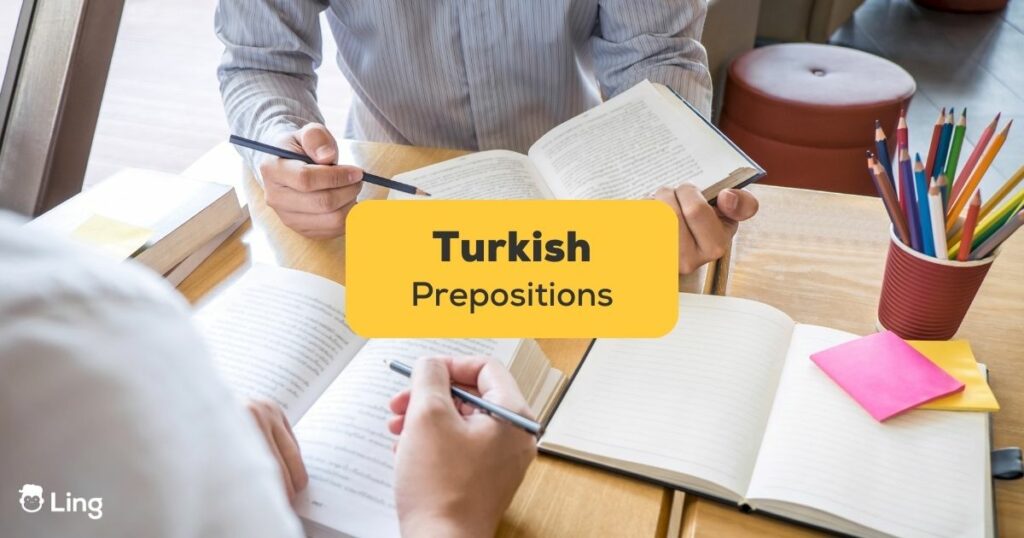After spending a bunch of time learning Turkish grammar, the next topic in line is Turkish prepositions!
You know how children play with their toys “on” the table, right? Or how we give big hugs “to” our friends? Yep, those words “on” and “to” are examples of prepositions! They tell us where our stuff are or who is getting our hugs. Prepositions help us make our sentences more clear no matter what your native language is, and Turkish is no exception.
Let’s learn Turkish prepositions so that you can make your sentences more fluent and precise!
Introduction To Turkish Prepositions
Turkish postpositions (words that indicate place and time at the end of a phrase) and prepositions are called “edat” in Turkish, and they are words that are placed in front of nouns or pronouns to show the relationship between two elements in a sentence.
Turkish case suffixes can sometimes function as prepositions in a similar way to English prepositions. For example, the ablative case suffix in Turkish (-den/-dan) can indicate the point of departure and comparison when attached to the point of reference, just like “from” in English.
Turkish prepositions can be formed by adding suffixes to the complemented noun. For instance, the locative case suffix gives the same meaning as the English preposition “in,” and the ablative case suffix gives the same meaning as “from.”
Some common Turkish prepositions include: içinde (in), üzerinde (on), yanında (beside), altında (under), arasında (between), karşısında (opposite), esnasında (during), dolayı (because of), sayesinde (thanks to), zarfında (during & while), etc.

The Most Commonly Used Turkish Prepositions
Turkish prepositions can be used in various contexts to express location, time, reason, and other relationships between elements in a sentence. Let’s see the most commonly used Turkish prepositions with examples!
1. İçinde – In
Imagine your cat hiding “in” a colorful box. In Turkish, you should say “içinde” to show that something is inside something else. Here’s an example:
– Kitap masanın içinde. (The book is inside the table.)
2. Üzerinde – On
Now, let’s imagine your cat sitting “on” a chair. In Turkish, you should say “üzerinde” to show that something is on top of something else. Here’s an example:
– Çiçek masanın üzerinde. (The flower is on the table.)
3. Yanında – Beside
Imagine your cat standing “beside” you while working on the laptop. In Turkish, you can say “yanında” to show that something is right next to something else. Here’s an example:
– Oyuncaklar yatağın yanında. (The toys are beside the bed.)
4. Altında – Under
Picture your cat hiding “under” the bed after a fun day of play. In Turkish, you should say “altında” to show that something is below something else. Take a look at this example:
– Ayakkabılar dolabın altında. (The shoes are under the closet.)
5. Arasında – Between
Imagine two cute cats playing “between” colorful cushions. In Turkish, you should say “arasında” to show that something is in the middle of two other things. Here’s an example:
– Kediler minderlerin arasında oynuyor. (The cats are playing between the cushions.)
6. Karşısında – Opposite
Now, let’s imagine your cat sitting “opposite” you at the table. In Turkish, you should say “karşısında” to show that something is directly across from something else. Here’s an example:,
– Arkadaşın senin karşında oturuyor. (Your friend is sitting opposite you.)
7. Sonra – After
Imagine eating your favorite dessert “after” finishing your dinner. In Turkish, you should say “sonra” to show that something happens later in time. Here’s an example:
– Yemekten sonra tatlı yedik. (We ate dessert after dinner.)
8. Dolayı – Because of
Imagine getting a big hug “because of” your kindness. In Turkish, you should say “dolayı” to show the reason behind something. Take a look at this example:
– Tebrikler dolayı, teşekkür ederim. (Thank you because of your congratulations.)
9. Sayesinde – Thanks to
Imagine getting a special gift “thanks to” your good grades. In Turkish, you should say “sayesinde” to show that something happens because of someone or something else. Check out this example:
– Başarın sayesinde ödül kazandın. (You won a prize thanks to your success.)
Other Turkish Prepositions
Here’s the table with the English prepositions with their Turkish correspondences:
| English Preposition | Turkish Prepositions |
|---|---|
| In | İçinde |
| On | Üzerinde |
| Beside | Yanında |
| Under | Altında |
| Between | Arasında |
| Opposite | Karşısında |
| After | Sonra |
| Because of | Dolayı |
| Thanks to | Sayesinde |
| Without | -siz/sız/suz/süz |
| At | -de/da |
| Next to | Yanında |
| During | Esnasında |
| Via | Aracılığıyla |
| Among | Aralarında |
| Around | Etrafında |
| Towards | Karşı |
These are some of the most commonly used Turkish prepositions and their meanings. Now you have a handy table to refer to whenever you want to use these words in Turkish sentences!
Start Learning Turkish With Ling!
Are you looking for the best app to take Turkish lessons from the comfort of your phone? Then you’ve come to the right place!
Ling is an all-in-one language-learning app for learning conversational Turkish at home. What sets Ling apart from other language learning apps is its interactive exercises, real-life vocabulary, and focus on conversational skills such as listening, speaking, and pronunciation.
But wait, there’s more! Ling also offers an array of incredible features that will elevate your language-learning experience to new heights. Prepare to be captivated by engaging writing and listening exercises designed to immerse you in the language like never before. With it in your favorite device, you can finally embrace real-life vocabulary and phrases, ensuring you’re equipped to navigate any situation with ease and confidence.
So what are you waiting for? Download Ling now from the App Store or Play Store and connect through language today!
Also, remember to check our Turkish blog for new articles every week to learn more about the Turkish language and culture!
Görüşürüz!


































































